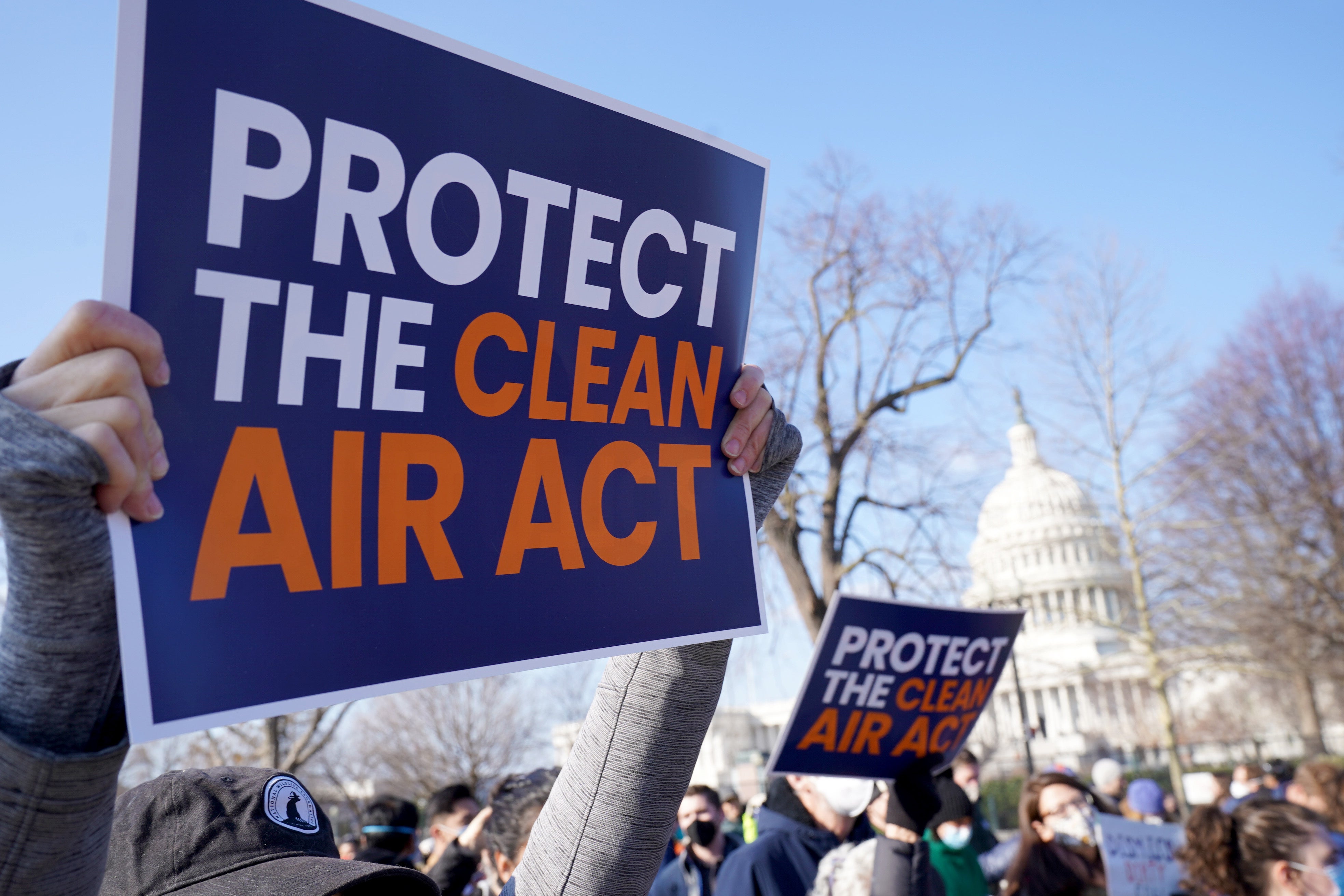Supreme Court weighs threat to US emission cuts as UN releases ‘atlas of human suffering’ climate report
Lawyers representing West Virginia, along with 19 other Republican-led states and coal companies, urged the court to restrict the Environmental Protection Agency’s ability to reduce carbon emissions from power plants

Your support helps us to tell the story
From reproductive rights to climate change to Big Tech, The Independent is on the ground when the story is developing. Whether it's investigating the financials of Elon Musk's pro-Trump PAC or producing our latest documentary, 'The A Word', which shines a light on the American women fighting for reproductive rights, we know how important it is to parse out the facts from the messaging.
At such a critical moment in US history, we need reporters on the ground. Your donation allows us to keep sending journalists to speak to both sides of the story.
The Independent is trusted by Americans across the entire political spectrum. And unlike many other quality news outlets, we choose not to lock Americans out of our reporting and analysis with paywalls. We believe quality journalism should be available to everyone, paid for by those who can afford it.
Your support makes all the difference.The Supreme Court on Monday heard oral argument in a case that could have lasting impacts on the US government’s ability to cut planet-heating emissions, a necessary step in the country’s pledge to reach net-zero by 2050.
Hours after the United Nation’s leading climate body issued a warning that billions are already suffering the impacts of the climate crisis - and the window to avert catastrophic global heating is rapidly closing - the top court heard oral arguments in the case, West Virginia v Environmental Protection Agency (EPA).
The issue at hand is whether EPA has the power to regulate greenhouse gas (GHG) emissions from existing coal-fired power plants under the 50-year-old Clean Air Act.
Coal is the dirtiest, most carbon-intensive of fossil fuels. While it generated only 24 per cent of US electricity in 2019, the fossil fuel accounted for about 61 per cent of CO2 emissions in the sector.
Lawyers representing West Virginia, along with 19 other Republican-led states and coal companies, urged the court on Monday to restrict the federal agency’s ability to reduce emissions from power plants.
“How we respond to climate change is a pressing issue for our nation, yet some of the paths forward carry serious and disproportionate costs for States and countless other affected parties,” the states wrote in October in urging the Supreme Court to take the case.
The Biden administration strongly objected after the case was added to the docket with EPA administrator Michael Regan noting that courts “have repeatedly upheld EPA’s authority to regulate dangerous power plant carbon pollution”.
Government lawyers acted in defense of EPA on Monday alongside support from power companies and environmental organisations.
The Supreme Court has a 6-3 conservative majority after former President Donald Trump was able to nominate three justices to the bench, and it has already shifted to the right on issues, favoring less government oversight.
Last month justices voted 6-3 to toss out Mr Biden’s mandate for businesses with more than 100 employees to institute vaccine or regular testing policies.
But even some conservative justices likely to be wary of sweeping EPA authority asked questions on Monday about the catastrophic impact of climate change and what that meant for balancing regulatory effects.
But conservative Justice Samuel Alito questioned if there was “concrete limitations” on EPA to push beyond shifting electricity generation away from fossil fuels to cleaner sources, as long as costs were not extraordinary or reliability was threatened.
The court’s decisions could kneecap President Joe Biden’s promise to decarbonise the US electric grid by 2035 as part of the broader plan to slash domestic emissions. The president’s ambitious climate agenda is already on the ropes after his Build Back Better legislation stalled in Congress.
Monday’s assessment from the Intergovernmental Panel on Climate Change said half of the world is now highly vulnerable to climate impacts in a sobering report described as an “atlas of human suffering”.
Jason Rylander, an attorney with the Center for Biological Diversity, an environmental respondent in the case, told The Independent that the Supreme Court hearing was taking place in absence of an EPA rule on the issue.
In 2016, the Obama administration’s Clean Power Plan was blocked by the Supreme Court and never took effect. The Trump administration then introduced the Affordable Clean Energy (ACE) rule in its place but that was struck down by US Court of Appeals for the DC Circuit last year.
“It would be very odd for the court to issue what amounts to an advisory opinion about EPA’s authority when the Biden administration has said that it’s going to potentially take an entirely different approach to regulating emissions from power plants,” Mr Rylander said.
A decision is expected from the Supreme Court in the coming months.
Should the Supreme Court rule that EPA does not have broad authority to regulate emissions - and issue an expansive ruling in favor of West Virginia - it would “deal an enormous blow to the US’s near- and longer-term emissions reduction goals and, by extension, our planet’s climate,” Dr Kristina Dahl, a senior climate scientist with the non-profit Union of Concerned Scientists, told The Independent in an email.



Join our commenting forum
Join thought-provoking conversations, follow other Independent readers and see their replies
Comments